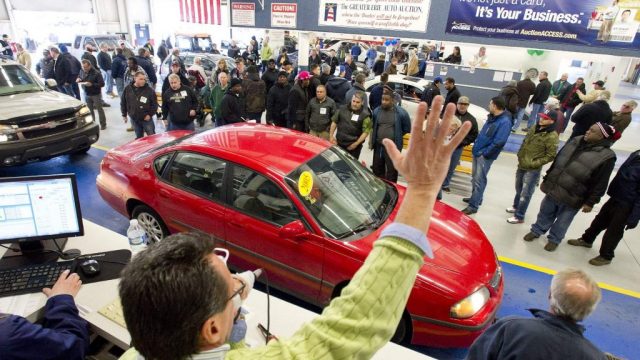6 Easy Facts About Kollective Automotive Group Explained
6 Easy Facts About Kollective Automotive Group Explained
Blog Article
The 3-Minute Rule for Kollective Automotive Group
Table of ContentsMore About Kollective Automotive GroupAbout Kollective Automotive GroupKollective Automotive Group - QuestionsExamine This Report on Kollective Automotive GroupThe smart Trick of Kollective Automotive Group That Nobody is Talking About
That had actually not held true, before the First Globe War, when most of domestic cars and truck makers automatically restored their dealership franchises at the end of the schedule year. Automatic renewal afforded a certain level of service protection particularly for low quantity distributors. Franchise business revival assurances like that had actually all however disappeared by 1925 as automobile manufacturers regularly ended their the very least lucrative electrical outlets.Such callous procedures just softened after the 2nd Globe War when some residential car manufacturers began to prolong the length of franchise business agreements from one to 5 years. Carmakers might have still reserved the right to end contracts at will; nonetheless, several franchise business contracts, beginning in the 1950s, consisted of a new arrangement intended straight at another similarly irritating trouble namely protecting car dealership sequence.
:max_bytes(150000):strip_icc()/car-dealer-showing-new-car-6938e02d5076488e91d38edb72054770.jpeg)
Everything about Kollective Automotive Group
One continual source of irritability in between dealerships and auto manufacturers concerned the function representatives should be playing in their corporation's decision-making process. During the initial half of the 20th century, legions of accountants and program directors had rubber-stamped almost all decisions authorized by their specific Boards of Supervisors. These program heads, with the solid support of their corresponding boards, thought that they understood what was ideal for their associates.
The new, busy international market presented a vast range of remarkable new economic and financial challenges never visualized by Detroit's extremely traditional leading management prior to. Particularly, the numerous service predicaments that arose at the time of the Millennium would have been much less serious had Detroit's Big 3 adopted a much more proactive company position when they had the opportunity to do simply that in the 1970s and 1980s.
Essentially, Detroit's Big 3 rejected to acquiesce to their growing needs by their several outlets for higher freedom and more input on the company decision-making process itself - https://kollectiveag.start.page. Its board participants even went so far as to classify a few of the dissenting suppliers as "abandoners (kollective group)." In their minds, it was simply a matter of concept and tradition
The slightest assumption of company weakness, consequently, could prompt unverified reports worrying the future leads of those automobile suppliers. Detroit's Big 3 made it quite clear that it would not tolerate such actions. Detroit car giants firmly insisted that their lots of representatives must attempt whenever possible to resolve any type of misguided service rumors that may spread out disharmony amongst their rank-and-file.
The Ultimate Guide To Kollective Automotive Group
Recognized for its resourceful use of capital, this new worldwide business spirit approved open discussion amongst distributors, marketing professionals and makers. Under this more open-end setup, each participant lent its expertise to the others with the complete objective of making the very best possible items at the least expensive cost. Nobody company controlled that group's internal circle.

The 1990s saw various other pressing financial problems come to the fore. https://disqus.com/channel/discusschitchatchannel/discussion/channel-discusschitchatchannel/kollective_automotive_group/. A lot of those issues focused on the expanding requirement of most dealers to preserve good earnings levels in the middle of an ever-dwindling neighborhood market. That issue was compounded even better by the urgency positioned on Detroit's Big Three to far better manage the many problems lodged against their outlets by disgruntle consumers
Numerous buyers had declared that some unprincipled sales agents had actually read more obliged some brand-new cars and truck customers to purchase pricey accessory packages in the hope of safeguarding low rate of interest lendings. Manufacturers replied to such accusations by claiming that they did not condone such activities and that there was no link whatsoever in between the price of an automobile and the rate of interest charged by the dealership for that details car.
Examine This Report about Kollective Automotive Group

Also those retailers obstructed by genuine franchise business constraints, delighted in a specific quantity of business freedom when it came to purchasing and distributing their product and services. That was not true for the bulk of auto dealers whose producers continuously tested every organization move they made. Those arbitrary, and at times, counter intuitive policy adjustments placed local dealerships in a very tenuous business situation as they aim to do the ideal thing for their lots of clients.
Car dealerships offer a range of services associated with the buying and selling of automobiles. Among their primary features is to work as intermediaries (or intermediaries) between car manufacturers and customers, purchasing automobiles directly from the producer and afterwards marketing them to customers at a markup. Additionally, they typically offer funding choices for buyers and will certainly aid with the trade-in or sale of a customer's old automobile.
Fascination About Kollective Automotive Group
Together, these departments work to offer a seamless experience for cars and truck purchasers. When buying a vehicle from a dealer, there are several records you will require to have on hand.
Report this page